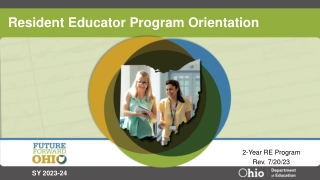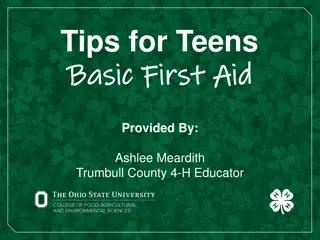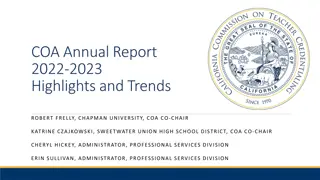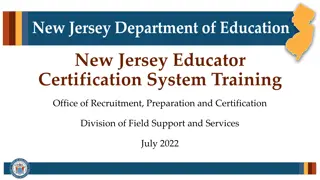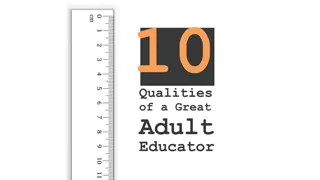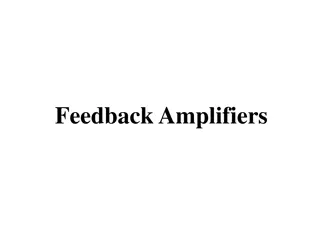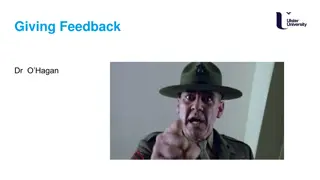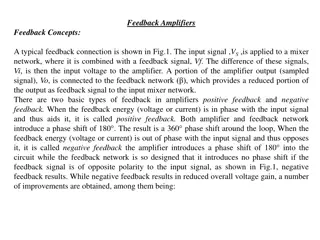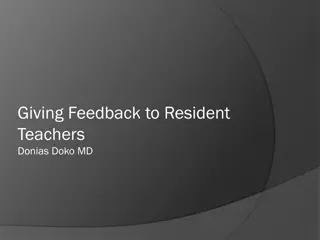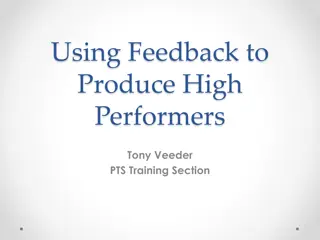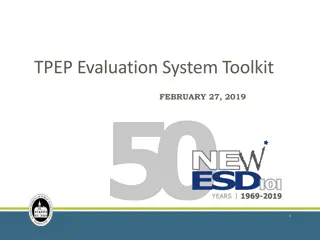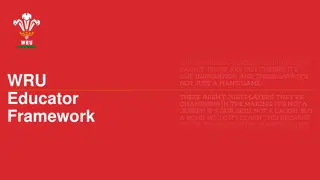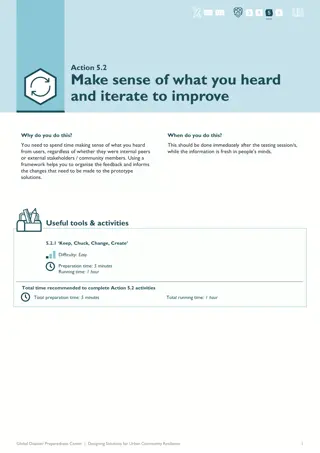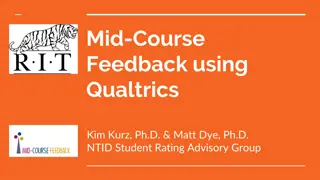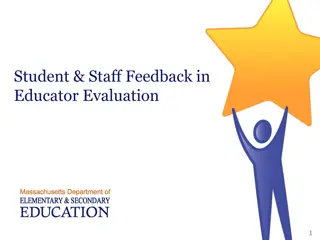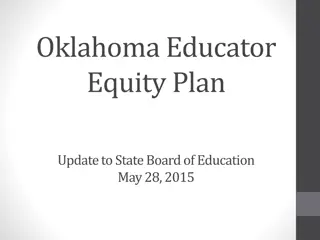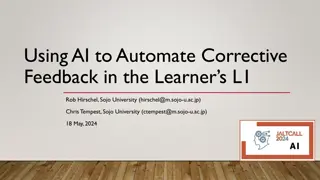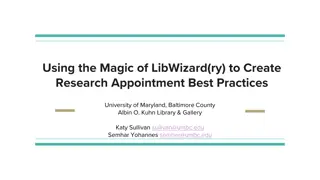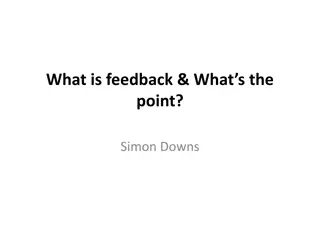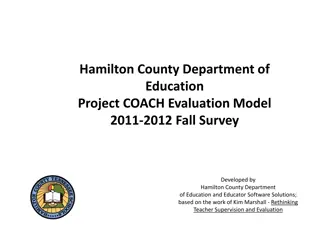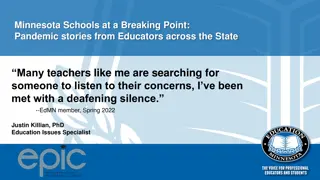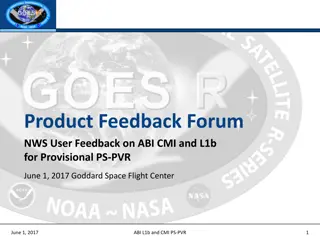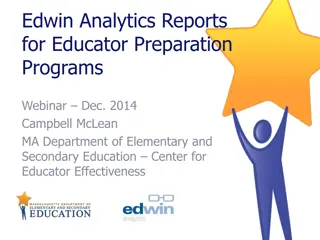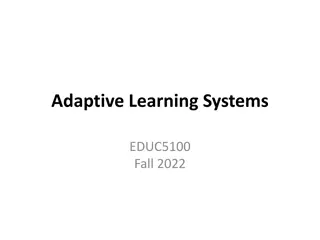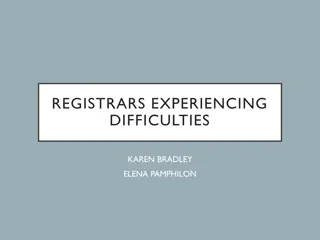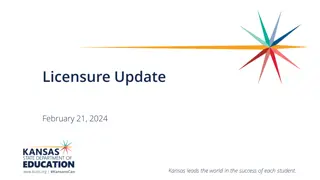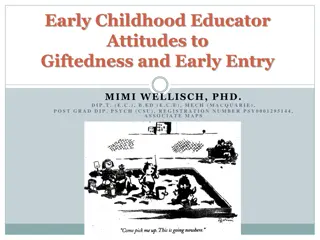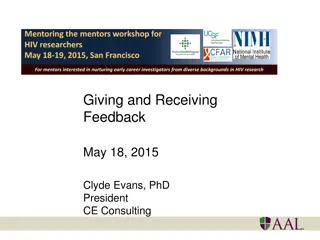Resident Educator Program Orientation
This orientation program provides information on the Ohio Resident Educator Program, including topics such as teacher residency and induction programs, mentoring principles, and the Resident Educator Summative Assessment (RESA). It also discusses the different types of Resident Educator Licenses and
1 views • 26 slides
Transforming Educator Preparation in Arizona
Arizona Coalition for Educator Preparation and Practice (ACEPP) is dedicated to improving educational outcomes by focusing on students with disabilities and enhancing professional learning for educators. Their initiatives include aligning state reading initiatives with High-Leverage Practices (HLPs)
0 views • 20 slides
The Role of Artifacts and Evidence in Educator Evaluation and Support
Exploring the role of artifacts and evidence in educator evaluation, this content covers the three categories of evidence required by the Oregon Framework. It delves into the efficient process that reduces redundancy, essential components of SLG goals, and the types of evidence relevant to professio
0 views • 15 slides
Teen Basic First Aid Tips by Ashlee Meardith Trumbull County 4-H Educator
Learn basic first aid tips for teens provided by Ashlee Meardith Trumbull County 4-H Educator. The tips cover handling bug/insect bites, animal bites, poisoning incidents, burns, cuts, and scrapes. Each section includes common symptoms and appropriate first aid measures to take in case of emergencie
4 views • 11 slides
Enhancing Student Learning Through Effective Feedback Strategies
Effective feedback plays a crucial role in improving student learning outcomes by providing specific information that students can use to enhance their performance. This content explores the importance of feedback, examples of good feedback practices, qualities of good feedback, and what components
5 views • 16 slides
Theresa S. Clark - Diabetes Educator Program Coordinator
Theresa S. Clark, MS, RD, LD, CDE, BC-ADM, is a dedicated Diabetes Educator and Program Coordinator at the Diabetes Resource Center in Hopkinsville, KY. She specializes in insulin therapies and teaches patients about insulin administration, carbohydrate counting, and mealtime insulin dosing. Certifi
1 views • 50 slides
California Educator Preparation Programs: Highlights and Trends 2022-2023
The California Educator Preparation Programs Annual Report for 2022-2023 showcases key highlights and trends in the field. It includes insights on accreditation status, site visits, distribution of institutions, largest number of preparation programs, and members of the Committee on Accreditation (C
0 views • 20 slides
New Jersey Educator Certification System Training Overview
The New Jersey Educator Certification System (NJEdCert) has replaced the Teacher Certification Information System (TCIS) to streamline the certification process. This system offers real-time updates, automated notifications, and enhanced reporting capabilities for educators, colleges, and school dis
0 views • 62 slides
Qualities of a Great Adult Educator
Discover the essential traits that make a great adult educator, including being creative, wise, empathetic, dedicated, humble, collaborative, persistent, organized, consistent, and courageous. Specific feedback is highlighted as crucial, creating intrinsic motivation and outlining reflective points
0 views • 39 slides
Effective Feedback Strategies for Learning Enhancement
Feedback plays a crucial role in the learning process. This session focuses on strategies for providing effective feedback to improve learning outcomes, course, and assignment design, best practices, and tools for efficient feedback delivery. Understanding the importance of prompt feedback and diffe
3 views • 20 slides
Understanding Feedback Amplifiers: Structure, Properties, and Topologies
Electronic circuits rely heavily on feedback mechanisms, particularly negative feedback, for various purposes such as desensitizing gain, reducing distortion, controlling impedance, and improving amplifier bandwidth. This article explores the general structure of feedback, properties of negative fee
0 views • 68 slides
Enhancing Feedback Practices with Audio-Visual Technology: A Study on Student Satisfaction and Attainment
This presentation delves into the implementation of Audio-Visual Feedback (AVF) technology to improve assessment feedback practices in an educational institution. The study explores the impact of AVF on student satisfaction levels compared to traditional written feedback, as well as its influence on
0 views • 21 slides
Understanding the Importance of Feedback in Achievement Enhancement
Feedback plays a crucial role in encouraging or discouraging behavior, making it essential to provide constructive feedback that focuses on growth and improvement. Improper feedback can lead to incompetence in the workplace. Learn about the definition of feedback, how to give feedback effectively, a
2 views • 22 slides
Understanding Feedback Amplifiers in Electronic Circuits
Feedback amplifiers play a crucial role in electronic circuits by providing mechanisms for controlling gain, stability, and overall performance. There are two basic types of feedback - positive and negative, each offering distinct advantages. The four ways of connecting feedback signals involve volt
0 views • 18 slides
Enhancing Feedback Strategies in ELA Learning Project Day
Refine understanding of ELA, engage with student exemplars, and design constructive feedback in a structured agenda. Activities include generating feedback, digging deeper into feedback processes, and considering the impact of timely and specific feedback on student growth in learning and skills. Co
0 views • 31 slides
Effective Feedback Strategies for Resident Teachers
Effective feedback is critical for the growth of resident teachers. This guide covers types of feedback, why it's important, what makes feedback effective, behaviorally anchored rating scales, models for giving feedback, and key tips for delivering feedback successfully.
0 views • 14 slides
Effective Feedback Strategies for High Performance
Feedback plays a crucial role in helping individuals improve performance and reach their full potential. From providing helpful feedback to reinforcing desired behaviors, this guide explores various strategies, including redirection, reinforcement, and F.A.S.T. feedback, to enhance workplace perform
0 views • 21 slides
Enhancing Postgraduate Academic Writing: Feedback Collaboration Model
Developing a collaborative model for postgraduate academic writing courses involves understanding the role of feedback, focusing on content feedback, and exploring the intersections between discipline specialist and writing tutor feedback to improve academic writing abilities. Feedback offers valuab
1 views • 27 slides
Effective Educator Evaluation System Toolkit for Districts
The TPEP Evaluation System Toolkit provides a comprehensive guide for leading educator evaluation systems in schools and districts. It covers key elements such as district leadership, professional learning, and self-assessment opportunities. The toolkit aims to enhance educator effectiveness and pro
0 views • 20 slides
Enhancing Educator Success: The WRU Educator Framework in Action
WRU Education aims to empower a successful educator workforce through positive learning experiences and a robust Educator Framework. By focusing on recruitment, retention, and development, WRU ensures a thriving workforce through accessible learning programs. The implementation of the EAST principle
0 views • 19 slides
Iterative Feedback Framework for Prototype Improvement
The iterative feedback framework involves making sense of user feedback using the Keep, Chuck, Change, Create (KCCC) model to iterate and enhance prototype solutions. This process helps organize input from testing sessions, informing necessary modifications for better outcomes. The framework emphasi
1 views • 26 slides
Understanding Mid-Course Feedback Using Qualtrics
Mid-Course Feedback (MCF) is a valuable process that allows students to provide feedback on their courses mid-semester, impacting teaching strategies, communication, materials, and more. This feedback benefits both students and instructors by improving teaching effectiveness, student satisfaction, a
0 views • 21 slides
Importance of Student and Staff Feedback in Educator Evaluation
Student and staff feedback plays a crucial role in educator evaluation, providing valuable insights into areas of strength and growth. Informed by evidence such as surveys, observations, and artifacts, feedback helps educators tailor their practice, fostering two-way communication and professional d
0 views • 14 slides
Educator Preparation & Pathways (EP&P) Overview and Staff Information
Discover an overview of the Educator Preparation & Pathways (EP&P) program, including details about the EP&P Committee, Oregon Administrative Rule Chapter 584, and staff contacts. Meet key personnel such as Dr. Shara MonDragon, Kirsten Plumeau, Kristin Rush, Dr. Mark Van Ryzin, Richelle Krotts, and
0 views • 5 slides
Understanding Cascade Control Systems in Industrial Processes
Cascade control systems play a crucial role in improving process control efficiency by incorporating feedback loops within feedback loops. This type of control architecture helps to better handle disturbances and variations in the process by creating secondary loops that monitor specific parameters.
0 views • 8 slides
Update on Oklahoma Educator Equity Plan to State Board of Education
Oklahoma's Educator Equity Plan Update to the State Board of Education on May 28, 2015, highlighted challenges identified by stakeholder focus groups, including equity gaps in teacher distribution in high poverty and minority schools. The plan focuses on addressing two main equity gaps related to te
0 views • 8 slides
IEEE 802.11-17/0044 NDP Short Feedback Design
The document discusses the need for short simultaneous feedback from multiple STAs in IEEE 802.11 systems for improved efficiency. It introduces the NDP feedback mechanism and proposes a signaling technique to efficiently collect feedback from a high number of STAs. The mechanism involves UL MU tran
0 views • 19 slides
AI Automation for Corrective Feedback in Language Learning
Exploring the utilization of AI technology to automate and enhance corrective feedback in language learning, addressing challenges such as time constraints, delayed feedback, and student comprehension. Introduction of a new AI text tool by Marcus Green for accessible and effective feedback provision
0 views • 13 slides
Enhancing Research Appointment Services at UMBC Library
UMBC subject librarians implemented a feedback survey to improve research appointment services. By analyzing feedback data, shared best practices were developed to ensure quality and consistency. The project timeline included identifying goals, drafting the timeline, creating the feedback form, and
0 views • 7 slides
Understanding the Importance of Feedback in Learning and Development
Feedback plays a crucial role in providing information about performance or behavior to affirm strengths and improve weaknesses. It helps individuals become consciously competent by identifying areas for improvement through formative assessment. Effective feedback enhances motivation, promotes learn
0 views • 33 slides
Evaluation Model for Teacher Supervision and Feedback in Education
Evaluation model conducted by Hamilton County Department of Education in collaboration with Educator Software Solutions, based on Kim Marshall's work on rethinking teacher supervision and evaluation. The evaluation covers aspects like grade levels served, positions held by educators, goal setting co
0 views • 18 slides
IEEE 802.11-19/0709r0 - Immediate and Delayed Feedback May 2019
The document discusses immediate and delayed feedback mechanisms in IEEE 802.11-19/0709r0, focusing on parameters, feedback types, and ranging options. It explores variations in feedback direction and types, proposing options for phase shift feedback and distinguishing between RSTA-to-ISTA and ISTA-
0 views • 6 slides
Minnesota Schools at a Breaking Point: Educator Voices Amidst Pandemic Challenges
Educators in Minnesota are facing unprecedented challenges, including systemic failures, unsafe working environments, and educator attrition. The Educator Policy Innovation Center highlights the severity of the situation, emphasizing the voice of educators and the impact on students. National trends
0 views • 10 slides
Product Feedback Forum at NWS: Provisional PS-PVR User Feedback on ABI, CMI, and L1b
A comprehensive feedback system managed by PRO at NWS, focusing on user input for GOES-R products such as ABI, CMI, and L1b. The forum gathers feedback through surveys and weekly calls, addressing product quality issues and ensuring effective communication with field sites. Noteworthy discussions in
0 views • 18 slides
Edwin Analytics Reports for Educator Preparation Programs Overview
Edwin Analytics is a comprehensive platform housing analytical tools for educator preparation programs. It offers various reports catering to stakeholders at different levels, from superintendents to classroom teachers. The platform includes features like the Early Warning Indicator System and Posts
0 views • 24 slides
Understanding Feedback in Learning Systems
Exploring the role of feedback in educational settings, this content delves into the concept of providing information to learners by various agents. It discusses the importance of feedback in guiding learning progress, highlighting examples of correctness feedback and correct answer feedback. The be
0 views • 66 slides
Enhancing Educator Practices in Training Programs
Explore key topics related to educator responsibilities, from recording crucial information to addressing trainee concerns and identifying common themes. Discover strategies for giving feedback, understanding trainee needs through Maslow's Hierarchy of Needs, and overcoming challenges such as langua
0 views • 32 slides
Educator Licensure Update and Program Highlights
Update on licensure requirements, upcoming deadlines, and nontraditional routes to the classroom in Kansas. Information on out-of-state licenses, mentor programs, and educator preparation accreditation. Details on limited residency licenses, teacher apprenticeship programs, and the Teacher Mobility
0 views • 27 slides
Early Childhood Educator Attitudes to Giftedness Research Overview
Early Childhood Educator Attitudes to Giftedness and Early Entry research by Mimi Wellisch, PHD, explores the impact of gifted training on educator attitudes. It discusses the evolution of attitudes, training in giftedness, and regulation requirements for young gifted children in NSW. The research c
0 views • 33 slides
Feedback and Mentoring Workshop for HIV Researchers
Mentoring workshop for HIV researchers focusing on giving and receiving feedback, nurturing early career investigators, and working with faculty continuum. The workshop offers insights on feedback exercises, assumptions, and rhetorical questions about feedback. Participants are encouraged to reflect
0 views • 33 slides
